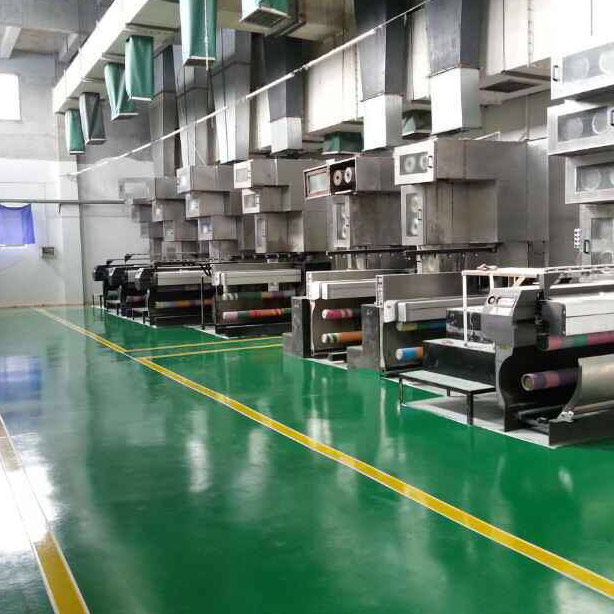- Polypropylene spinning machine
- Polypropylene FDY equipment
- Polyester POY spinning machine
- Polyamide FDY common and high strength equipment
- Polyester FDY equipment
- Polyester high strength equipment
- polyester、Polyamide、 Polypropylene BCF equipment
- Small spinning machine
- All kinds of spinning special parts
- The key points of control in the polypropylene FDY spinning machine process and their relationship with quality
- The establishment conference of Guangzhou Modern Textile and Garment New Quality Productivity Research Institute and the co-construction conference of the textile industry innovation ecosystem were held
- A Guide for Managers to Break Through: Empowerment Rather than Control: Helping Enterprises Bid farewell to Internal Friction and Activate the Intrinsic Motivation of Teams!
- The 2025 Textile and Garment Innovation Annual Conference and the Gongqingcheng Down Industry Development Conference came to a successful conclusion
- The technological upgrade of polypropylene FDY spinning machines empowers the production of diversified chemical fibers

- Contact:Mr. Huang Guofu
- Cel:0086-13901505556
- Fax:0086-519-83341119
- Email:czfb5556@126.com
- Add:No. 288-8 ChangLi Rd, Huangli Town, Changzhou, JS PRV.
Useless and useful work of managers
preface
In this competitive society, many managers of enterprises hope to manage their subordinates well through their efforts, but many of them are contrary to the facts, and they are tired and useless. So what are the futile efforts that managers tend to make in the process of management?
1. The useless work of managers
A team culture that encourages overtime
Under the pressure of anxiety, the higher the position, the greater the responsibility, the boss wants the employees to work hard, so that they can feel that their salary is worth, they can feel that the company has hope for the future, and they can relieve their anxiety to some extent.
So, when you see employees working overtime, the natural response is to encourage those employees. At the same time, praise them to the side of those who do not work actively.
But here's the thing: what you encourage, you get. Encourage overtime, and you get the workload. But is the amount of work ultimately what you need as a boss? Apparently not. We want results, we want output.
Employees are smart. They know how to read people and how to please the boss. So sometimes, when a boss sees an employee working late, he or she thinks he or she is finally paying off. But it's more likely that the employee is faking his or her efforts and giving him or her the "reverse booze."
And what works? Is to encourage results. Only in this way will employees find ways to achieve the output the company wants. If they can't get it done, they'll work overtime to get it done themselves.
Spend a lot of time on team building
Many managers love team building as a way to promote teamwork. Watching a team come together and be happy like a big family does relieve a lot of anxiety.
However, in fact, a rational and mature talent will know how to communicate and cooperate effectively to achieve their work goals. It is not necessary to get everyone together through team building first and make good relationships. Then, because the personal relationship between team members is good, they will cooperate more. According to McClelland's motivation theory, we have three high-level needs: power needs, achievement needs and affinity needs.
If it is the Internet industry, the characteristics are often high pressure, fast pace, need innovation, need to execute, so do well is often power needs and achievement needs.
These people, for the most part, like to be productive, be alone, think deeply, and that's what they want in their jobs: to work with equally smart people, to come up with cooler ideas together, without anyone slowing them down.
On the contrary, agreeableness, the need for a job often has the option of team harmony, and their presence somehow makes a team more cohesive.
But if you have a team full of people who are in love with each other, you will find that the team is like a family, but when it comes to work, they are neither improving nor pushing things forward. The team's seeming harmony may be a placebo for the manager.
Consider one/some team members irreplaceable
HiPo(High Potential) is a talent management project that many companies will do, that is to say: define the company's High Potential employees, and then focus on development and retention.
This is a good strategy to optimize resources, because resources are always limited, and deciding which employees to invest those limited resources in is really something to think about. Different talent potential is different, input-output ratio is very different.
Too often, however, managers go to the other extreme: they overvalue the importance of an individual on their team. According to Drucker, if a manager feels that a member of his team is irreplaceable, it may be because:
1) This person is not so good, but the manager doesn't have high requirements for him.
2) There are serious problems lurking in the management system, which are covered up by the existence of this person;
3) The manager has a lack of ability, and the employee supports a boss who is difficult to stand on his own feet.
Second, the manager's hardworking
In the era of the rise of individual value, how to establish trust based on psychological contract in the relationship between organizations and employees is an area that needs special attention.
Research shows that when the psychological contract is effectively fulfilled, employees will show higher job satisfaction, intention to stay and organizational trust. On the contrary, under normal circumstances, when employees think they have completed the work tasks of the organization, but the organization does not fulfill the corresponding obligations, then the violation of the psychological contract is likely to occur.
Therefore, Huawei's view on employees' "gratitude" is reasonable. Huawei emphasizes "responsibility" rather than "gratitude", which can well manage employees' "expectations" of the organization, and the two are in a mutually consistent with the expectation of the organization. On the surface, it may seem that there is less "warmth" in the organization, but in fact, employees are more likely to get performance results and satisfaction.
In contrast, many Chinese companies, has stressed the "company is a family", raising the expectations of company employees, but the company is not really a "home", can not use treatment of family members to treat employees, so employees can feel hurt, short of expectations, often appear a departure from the company the desired behavior, and even hurt each other.
Whether it is by working overtime, team building, relying on competent people, or promoting the corporate culture of "the company is a family", in fact, for enterprise management, it is futile. Really useful management, should be specific problem specific analysis, appropriate to the case. Today, let's take a look at how to manage two types of people in a company: "prickly" employees and the post-90s generation.
Three "prickly" employees and post-90s
Three strategies for Managing prickly employees
1. Excellent ability type -- "snubbing + encouraging" creates "tiger generals". Provide them with new jobs and new tasks in a timely manner, so that they are constantly challenged, guide and stimulate their strong work desire and excellence. Can also take timely help and icing on the cake combination. Deliberately NEGLECT them for a period of time, self-reflection, and then point out their crux in a timely manner, help them analyze and give spiritual encouragement and support.
2. Background resource -- process reengineering to eliminate the long "thorn" soil. To deal with the "prickly" employees with background resources, one is to get rid of the relationship of resource constraint and dependence, and fundamentally eliminate the soil of "prickly" such employees. Second, the implementation of process management reengineering strategy. Third, leaders should dare to show their swords and never tolerate, compromise and connive at the negative behaviors of background resource type "thorns".
3. No desire and no desire -- For such "prickly" employees, it is necessary to strengthen and enrich the reward and punishment system and intensity. In addition, the welfare system of the enterprise is directly linked to work performance, so as to break the thinking paradigm of such employees who regard the enterprise as a nursing home or medical hospital.
Research report on office behavior of post-90s generation
Unbound Space released the "Post-90s Office Behavior Research Report", the report on 1000 post-70s, 1000 post-80s and 1000 post-90s workers in Beijing, Shanghai, Guangzhou and Shenzhen (male and female 1:1 ratio).
Compared with those born in the 1970s and 1980s, those born in the 1990s have seven job preferences:
1. Post-90s are more willing to work in the business district with perfect supporting services, focusing on convenience rather than distance. When it comes to commuting to work, the post-90s generation is more environmentally friendly, seeking good but not fast transportation.
2. Compared with other age groups, the post-90s generation has significantly higher requirements for office environment, and co-working space is extremely popular among the post-80s and post-90s generation.
3. More than 70 percent of the post-90s can accept overtime work, but they pay more attention to overtime benefits than those born in the 1980s.
4.90 post-90s people think that colleagues should not only work together, but also enjoy themselves.
5. Growth space, salary and interests are the top priorities for the post-1990 generation when looking for a job.
6. Self-free corporate culture is what the post-90s want.
7. Compared with the post-80s generation, most post-90s don't care about career stability. For them, opportunity is more important than stability.
Disclaimer: This article is compiled from the Internet, the copyright belongs to the original author; If there is infringement, please inform in time and delete after verification.
- The establishment conference of Guangzhou Modern Textile and Garment New Quality Productiv
- The key points of control in the polypropylene FDY spinning machine process and their rela
- A Guide for Managers to Break Through: Empowerment Rather than Control: Helping Enterprise
- The 2025 Textile and Garment Innovation Annual Conference and the Gongqingcheng Down Indus
- The technological upgrade of polypropylene FDY spinning machines empowers the production o
- Textile News: Full-chain Efforts + Cross-border Breakthroughs + Talent Foundation - The Te
- The 2025 China Home Textile Fashion Innovation Conference grandly kicked off in Binzhou
- On the Important Role of Polypropylene Spinning Machines in Chemical Fiber Production
- Management Skills: Managing Problems = Managing Efficiency: Anchor the essence of manageme
- Shandong is promoting the transformation and upgrading of its textile industry through int




